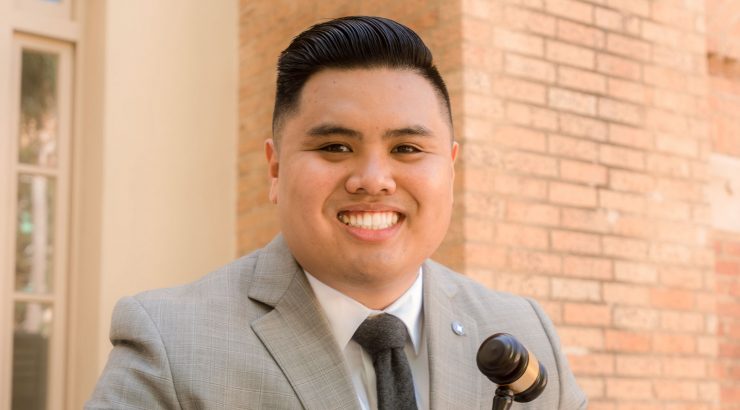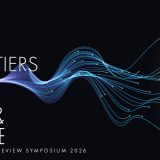
Making every day an opportunity for change Recent graduate Michael Romero (JD ’21) overcame housing insecurity on his path to a legal career—without anyone knowing
July 22, 2021
By all appearances, Michael Romero (JD ‘21) seems to have a bright future ahead of him. He just earned his JD from Chapman University’s Fowler School of Law. He recently got engaged to and moved in with his longtime girlfriend, who herself just graduated from optometry school. He completed an internship with Deloitte and has a job as a tax consultant waiting for him there after the bar exam. But for Romero, 25, none of these things seemed possible a decade ago.
“For me, law school was never just a goal growing up,” said Romero. “It wasn’t even a dream. Law school was a complete fantasy because it was something that seemed so physically impossible for me to ever achieve that the reality of my world and existence had to change for me to get there.”
Romero, who originally grew up in Southeast Los Angeles, was the youngest of three children being raised by a single mother, after he says they were abandoned and left financially ruined by his abusive father. During much of his elementary and middle school years, Romero and his family spent most of the time living out of their car, in between brief stays with relatives all around Southern California—but he kept the circumstances of his life hidden from teachers, classmates and the outside world.
“I brushed my teeth and washed my hair in public restrooms, did homework under parking lot street lights, recycled bottles to buy school supplies, and called the backseat of a van my bedroom, while lying to everyone I knew that my life was normal,” Romero said.
As he entered his teens, things did slowly start to improve for Romero and his family. One of his sisters started working while attending community college, and Romero reached an age where he could assert more influence over family decisions. “I was old enough to have an opinion,” he said. “That’s what when we started to pool our family money together, and so we got out of the situation.”
Romero had done independent study from grades 4 to 8 because he did not have a steady address to commit to one school, but once his family was finally able to rent a small apartment, Romero was able to attend regular high school. But even then, he still hid the reality of his personal struggles, despite having a large friend group and being involved in numerous extracurricular activities.
“I just built up this lie about my life,” said Romero. “I gave off a certain persona that everything was fine in life. It’s like the Mandela effect. I thought this was necessary to keep going, to do well at my school, to eventually get into college.”
And, eventually, Romero did get into college, although as a first-generation college student, he says he had to figure out that path for himself: “When I applied to colleges, I didn’t know how it worked.” He applied to numerous colleges and programs, and was accepted to several, but knowing he’d need to stay close to his family in case of an emergency, Romero decided to go to University of California, Irvine for his undergraduate studies.
Banking on his future
While working on a dual bachelor’s degree in Criminology, Law and Society and Political Science, Romero was hired as a bank teller at a Newport Beach Wells Fargo branch. He says it was the first time in his life he’d interacted with wealthy people and businesses. Romero quickly realized he had an affinity for finances. “I really started to learn how to make money work for people,” he said.
Because he had received several promotions at the bank—eventually becoming a licensed banker and brokerage associate—Romero says he was one promotion away from banking turning from just a college job into a real career.
“I saw a lot of successful business owners and investments,” said Romero. “A lot of the stories of business owners—how they got to where they were—that was always my curiosity, but since I was a kid, I always wanted to be a lawyer. So, I was like, how do I blend these two worlds?”
Romero says he made an 11th-hour decision and applied on the last day possible for law school. As with his undergraduate degree, Romero was accepted to several schools in California. But ultimately, he chose the Fowler School of Law, both to remain close to his family, but also because of his first exposure to the Chapman Family experience. Romero says that from the start, the first students he met—such as Dante Logie (JD ’19) and Hope Blain (JD ’19)—were “so nice and caring for me.”
“Chapman’s whole recruiting program, Scholars Weekend—I was like, ‘I’m sold,’” Romero said. “I loved it. It was an easy choice.”
After finishing his 1L year at the Fowler School of Law, Romero realized how he could merge his affinities for both the worlds of finance and the law.
“I already knew I liked finance and I could communicate with people about a touchy subject like money,” he said. “Then when I came to any law that was primarily based in numbers, I was like, ‘I know that,’ I’m comfortable in that area already.”
Although he gravitated toward securities law, Romero says he realized that most lawyers who work in that area come to it either as a second career or after years working in related fields—such as tax law. That suited Romero just fine.
“When people come to you for tax law, it’s not just because they have a legal problem,” said Romero. “They have a planning problem—how do I structure this money and what’s the most beneficial way to do it, and then what’s the legal way to do it. So that’s why it was a perfect blend of my worlds.”
‘That was when life hit me’
During the summer after his 1L year, Romero landed a coveted internship at the Securities and Exchange Commission in Philadelphia. After his first week there, however, he ended up spending nine days in the hospital—five in the ICU—when a tick bite likely infected him with Lyme disease.
“That was when life really hit me,” Romero said. “I legitimately thought I was going to die. I was at my dream internship. And now I’m in a hospital bed thinking it could all be over. I’ve always had big plans—I’ll help people, I’ll tell my story. But I never did it. After that, that’s when I really started pushing to be involved and be an open book about my life.”
Even while fighting for his life in a hospital 3,000 miles away from home, Romero’s first thoughts were of his professional responsibilities. “I was so worried I was going to get fired,” he said. But Romero says his superiors at the SEC were very understanding, and after getting out of the hospital, he was able to complete his internship, which he says he loved.
When Romero returned to the Fowler School of Law in the fall, he downplayed the damage wrought by his medical crisis, because he “didn’t want people to know I was struggling.” Not only was the left side of his body weakened and numb (which made walking with a cane necessary), his cognitive function was also affected.

Romero competed on both Moot Court and Alternative Dispute Resolution teams. (Photo courtesy Marlyss Maxham)
“Mentally, I was fried,” said Romero. “Words would flip. My handwriting changed. I was achy. I was in pain. I didn’t know how to live this way. I wanted to be normal. I was bitter. I was embarrassed. I was struggling because this is law school. I can’t afford for my grades to slip. I had to work double hard.”
Through that extra effort and with the passage of time, Romero’s mind returned mostly to normal function, and although he says the left side of his body still feels “mildly like it’s fallen asleep,” the former powerlifter says he’s “learned to live with it.”
You would never know Romero missed a beat. He earned three CALI awards for scoring the top grades in his respective courses. He became a leader on campus, serving as a Student Bar Association representative, president of the Moot Court Honors Board, co-president of the Corporate Law Society, and competitions chair of the Alternative Dispute Resolution team. He served as an Academic Fellow, a First-Generation Student Mentor, and a Student Ambassador. And upon graduating (with a certificate in Taxation), Romero won the ALI-CLE Scholarship and Leadership Award as well as Excellence Awards in Appellate Advocacy, Mediation, and Negotiation.
Making an impact
Before leaving Chapman, Romero knew there was one more important thing he had to do: He was finally going to share his story. For consideration as the graduation speaker at commencement, Romero wrote and submitted a speech entitled “The Street Light Scholar,” in which he revealed his childhood adversity and the fact that “for the past 20 years until this exact moment no one ever knew.”
Although he was not selected to be this year’s speaker, Romero says that when his speech made the rounds among his classmates, he found it immediately made an impact.
“People I’m not even close friends with wrote to me and told me about the struggles they had throughout and before law school,” he said. “We understand each other. The conversations I’ve had with people about life and how much more open, happy, and at peace they are after being able to speak their story—it’s profound.”
And now that Romero himself is in a better position to help others—with his legal career fairly well mapped out—he says it’s his dream to start his own charity foundation to support kids who are dealing with circumstances similar to the ones he hid for so long from almost everyone he knew.
“My goal after I take the bar is to do a charity drive to collect backpacks, books, everything, and just drop those off to homeless shelters,” said Romero. “When I was poor, having a normal backpack, it just makes you feel like a normal kid. Those small things change kids’ worlds.”
It’s really all part and parcel in Romero’s approach to life overall. Although he says he loves his job and what he’s able to do because of it, Romero believes that “our goals in life should not be a salary, job, or GPA.”
“Our goal should be our impact, because it is our impact on people that changes lives,” Romero said. “With each life you change, you change someone’s world. Every day is an opportunity—an opportunity to help someone, teach someone, and give someone a chance.”

